Edition: 26 August to 6 September 2024
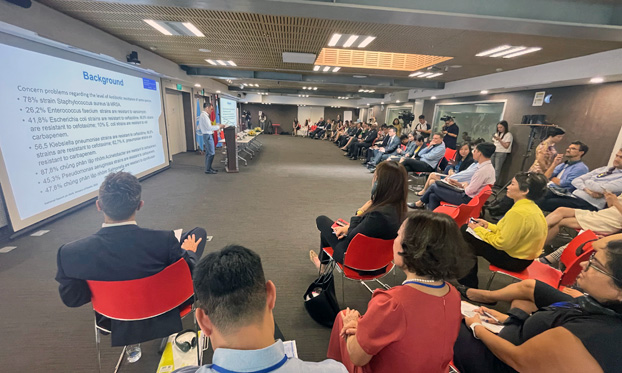 © FAO/Pawin Padungtod | VIET NAM Call for collaborative action to combat antimicrobial resistance
In an effort to combat the global threat of antimicrobial resistance (AMR), Viet Nam has called for unified action across all sectors. This call to action was made during a high-level roundtable meeting on AMR in HaNoi, on 29 August, where representatives emphasized the urgent need for collaboration to address this pressing issue. During the roundtable, stakeholders from various sectors, including government agencies, United Nations, embassies, research institutions, academia and development partners, came together to discuss the critical importance of addressing AMR. The Vietnamese government stressed the necessity of implementing the national action plan on AMR, focusing on responsible antimicrobial use in both health and agriculture sectors. Read more here. |
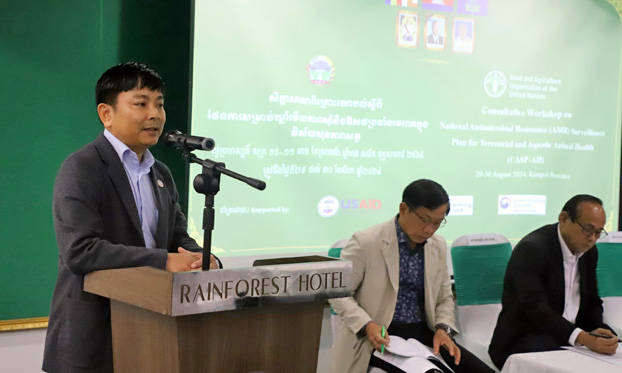 © FAO/Siheng Ngon | CAMBODIA Consultative workshop on national AMR plan for terrestrial animal health and aquatic animal health
FAO and the General Directorate of Animal Health and Production (GDAHP), the Forestry Administration and the Fisheries Administration of the Ministry of Agriculture, Forestry and Fisheries, co-organized the consultative workshop on national AMR plan for terrestrial animal health and aquatic animal health from 29 to 30 August in Kampot. The workshop was jointly funded by the United States Agency for International Development (USAID), the Fleming Fund and the Ministry of Food and Drug Safety, Republic of Korea. |
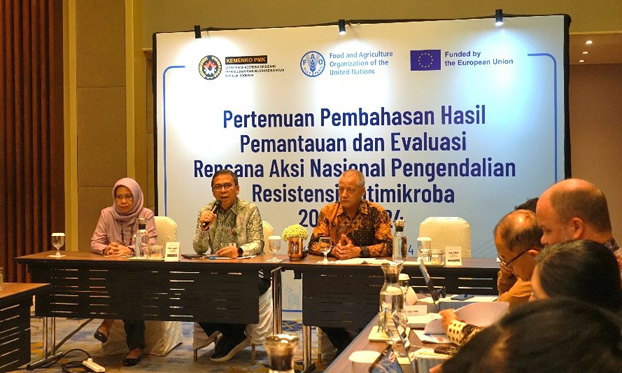 © FAO/Saskia Soedarjo | INDONESIA Evaluating the 2020-2024 national AMR action plan
A meeting was convened to assess the outcomes of the National Antimicrobial Resistance Action Plan (NAP AMR) 2020-2024 on 3 September. The meeting, organized by FAO in partnership with the Coordinating Ministry of Human Development and Cultural Affairs and with the support from the Ministry of Agriculture, the Ministry of Health, World Health Organization, World Organisation for Animal Health and the European Union, brought together stakeholders to evaluate the progress made in addressing AMR in Indonesia. Read the news here. |
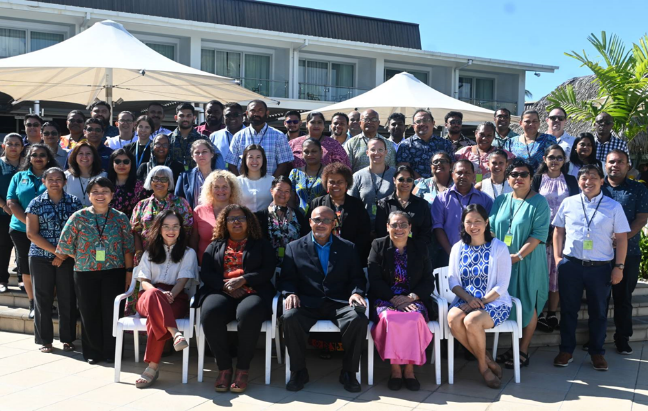 © FAO/Queenie Waqasavou | FIJI AND ASIA AND THE PACIFIC Fiji national action plan for AMR mid-term review multisectoral workshop
Supported by USAID, FAO, WHO and the multisectoral Fiji National Antimicrobial Resistance Committee (NARC) conducted a multi-sectoral workshop for the mid-term review of Fiji’s National Action Plan on Antimicrobial Resistance (NARC NAP AMR) 2022-2025 in Fiji from 5 to 6 September. On the first day of the workshop, participants reviewed the implementation status of the NAP AMR, identified key responsible agencies and organizations and discussed priorities for the remaining implementation period. On the second day, there were concurrent work planning sessions for the animal health and public health sectors, aiming to identify the NAP AMR activities that can be supported by FAO and WHO, respectively, under the Global Health Security investment in Fiji. The outputs of the workshop will feed into the development of the next NAP AMR for Fiji. |
Learn more about our work on AMR here.
| |
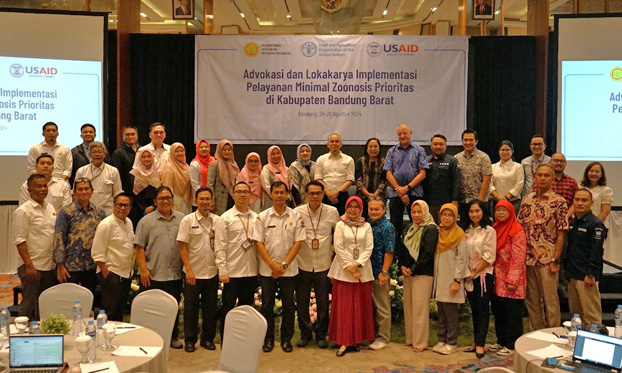 © fao/Alia Dwirahmani | INDONESIA Rollout of minimum service standards for priority zoonoses in West Bandung district From 28 to 29 August, DGLAHS, in collaboration with FAO and USAID, introduced a programme to implement minimum service standards for priority zoonoses in West Bandung district, West Java. The programme has now been expanded to West Bandung after the successful implementation in Sukabumi. A workshop marked the launch, bringing together local government officials to develop a comprehensive strategy for managing zoonoses in the region. The initiative emphasizes strict adherence to national protocols and aims to enhance collaboration between central and district governments. Read the news here.
|
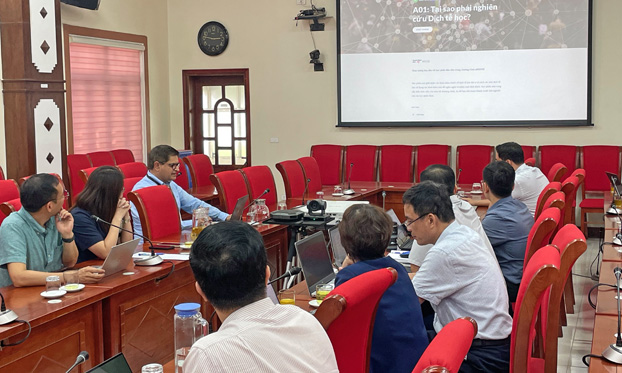 © fao/Pawin Padungtod | VIET NAM Workforce development consultation meeting FAO organized a surveillance workforce development consultation meeting with the Department of Animal Health, Viet Nam One Health University Network, USAID and the Asia Pacific Consortium for Veterinary Epidemiology (APCOVE) on 5 September in Hanoi. The meeting aimed at sharing the availability of training programmes and identifying how those programmes supported the requirement of surveillance workforce development in Viet Nam. FAO and APCOVE also met with Viet Nam National University of Agriculture to explore how the university can support the delivery of these training programmes.
|
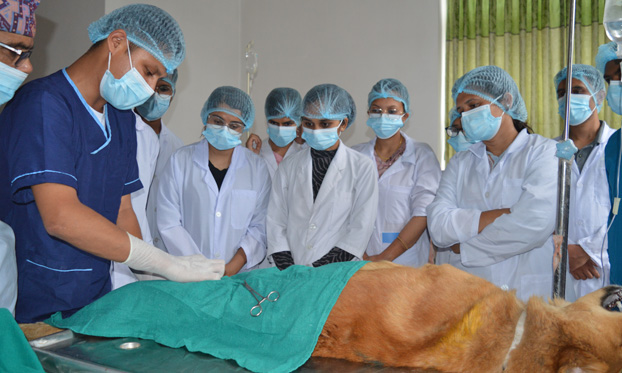 © fao/Surendra Karki | NEPAL Animal birth control surgery training for public and private veterinarians With funding from USAID, FAO supported the Department of Livestock Services to conduct a three-day “Hands-on animal birth control (ABC) surgery training” for public and private veterinarians from 29 to 31 August in Kathmandu. The training aimed to equip veterinarians with skills in dog population management to support the global “zero by 30” rabies elimination strategy. It was conducted in collaboration with the Central Referral Veterinary Hospital and the Veterinary Practitioners’ Association Nepal.
|
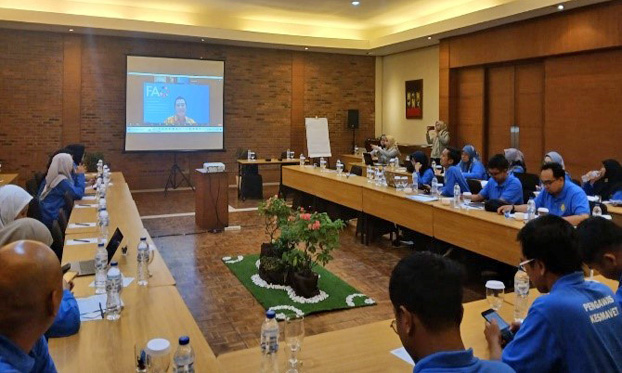 © fao/Azrina Nawawi | INDONESIA Training on infection, prevention, and control for veterinary public health personnel FAO, in partnership with the DGLAHS and USAID, conducted training on infection prevention and control for veterinary control number (NKV) auditors and veterinary public health inspectors from 26 to 30 August in Bogor. The training focused on implementing good practices in IPC, sanitary policies, animal product safety standards and business regulations. Its goal was to strengthen the capacity of animal health professionals at the provincial and district levels in biosecurity and NKV certification for livestock businesses. By training more qualified NKV auditors, the programme aims to address the shortage of these professionals in the provinces and regions.
|
Learn more about our work on capacity development here.
| |
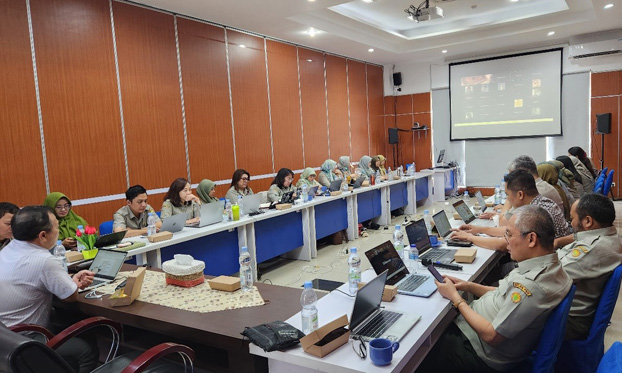 © FAO/Andri Jatikusumah | INDONESIA Meeting on the national animal health strategic plan
FAO, in collaboration with the Directorate General of Livestock and Animal Health Services (DGLAHS) of the Ministry of Agriculture and with support from USAID, conducted a meeting on the national animal health strategic plan in Bogor from 4 to 6 September. The meeting aimed to operationalize the national animal health system with the veterinary authority. Participants contributed to producing several outputs such as a draft roadmap for strategic infectious animal health zoonoses control (PHMS-Z), addressing highly pathogenic avian influenza, rabies, brucellosis, foot-and-mouth disease and lumpy skin disease. A strategy on surveillance roadmap for PHMS-Z was also drafted during the meeting. |
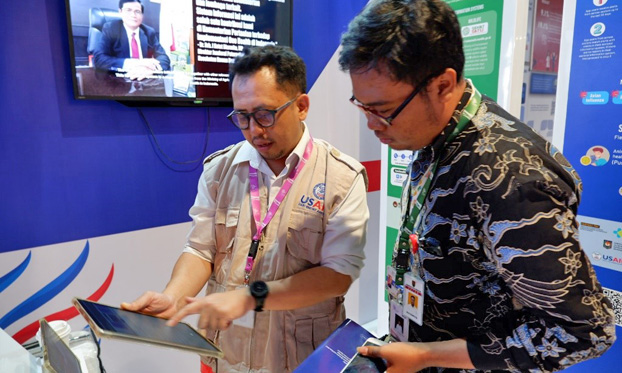 © fao/Satwika Movementi | INDONESIA Surveillance system exhibition at a high-level forum FAO participated in the Bappenas high-level forum for multi-stakeholders in Bali from 2 to 3 September, with support from USAID. The event aimed to promote country ownership and inclusion in development cooperation, improve accountability and transparency, and address current obstacles that hamper development and equality. International delegations from developed (OECD DAC) and developing (G77 and ASEAN) countries, private sectors, non-governmental organizations and academics attended this exhibition. FAO showcased an integrated health Surveillance Information system for Zoonosis and Emerging infectious diseases (SIZE). |
Learn more about our work on partnerships here. | |
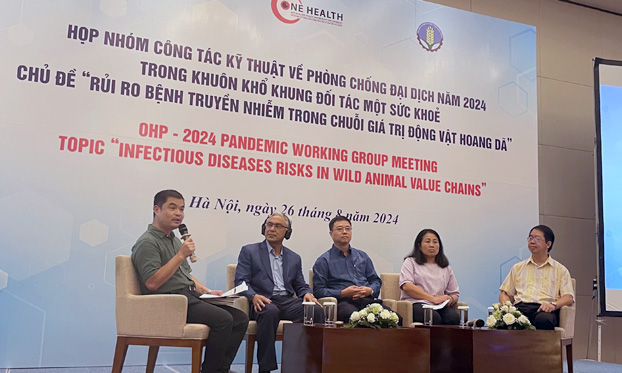 © FAO/Pawin Padungtod | VIET NAM One Health partnership technical working group on wildlife and pandemic prevention FAO, the Ministry of Agriculture and Rural Development (MARD) and One Health partners organized a multi-sectoral working group meeting on wildlife and pandemic prevention (OHP-PWG) in Hanoi on 26 August. Themed “Risks of infectious disease in the wild value chain”, the meeting was provided an opportunity for members including government, development partners and civil society organizations to share research results on the risk of disease emergence and transmission associated with wild animal value chains, and the management and biosecurity practices in wild animal facilities.
|
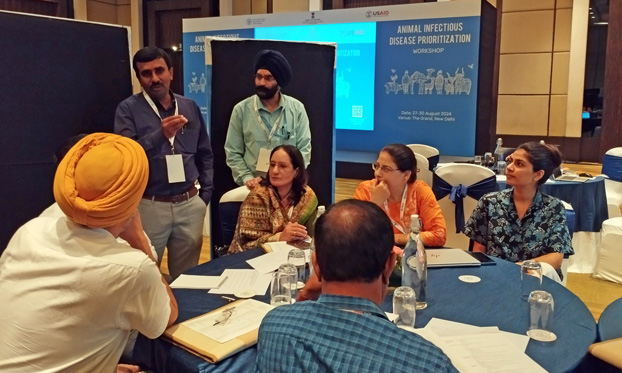 © FAO/Yin Myo Aye | ASIA AND THE PACIFIC AND INDIA Prioritization of animal infectious diseases using One Health tool FAO India, in collaboration with FAO Regional Asia Pacific and the Department of Animal Husbandry and Dairying, Government of India organized a workshop on animal infectious disease prioritization in Delhi from 28 to 30 August 2024. Ten animal infectious diseases were prioritized using the One Health Zoonotic Disease Prioritization (OHZDP) process to escalate animal disease and prevention control in India. The workshop, supported by USAID, aimed to strengthen disease control efforts across India and reinforced FAO’s commitment to safeguarding animal health and improving public health. Thanks to US CDC for providing materials and access to the portal for prioritization. Participants discussed the goals, next steps, indicators and timeline to expedite the implementation of prioritized diseases. Read more here.
|
| Learn more about our work on One Health here. | |
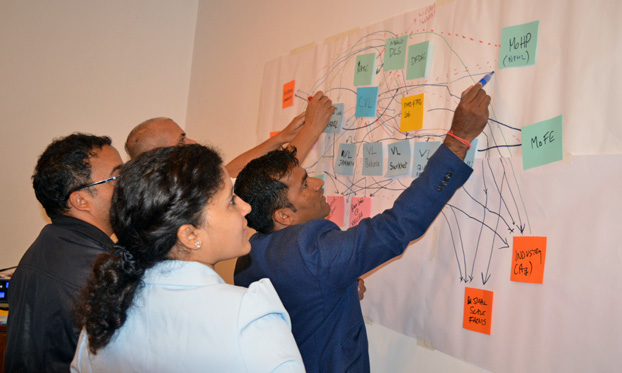 © FAO/Surendra Karki | NEPAL Laboratory roadmap development workshop
Through USAID and the Pandemic Fund project, FAO supported the Department of Livestock Services (DLS) to organize a three-day laboratory roadmap development workshop from 3 to 5 September in Nagarkot. The workshop aimed to develop a roadmap for strengthening Nepal's veterinary laboratory system based on earlier assessments using the FAO Laboratory Mapping Tool. Facilitated by FAO experts from the regional office, it was attended by senior officials from DLS, the central veterinary laboratory and other DLS laboratories. The workshop was conducted in collaboration with the central veterinary laboratory. |
Learn more about our work on capacity development of laboratory here.
| |
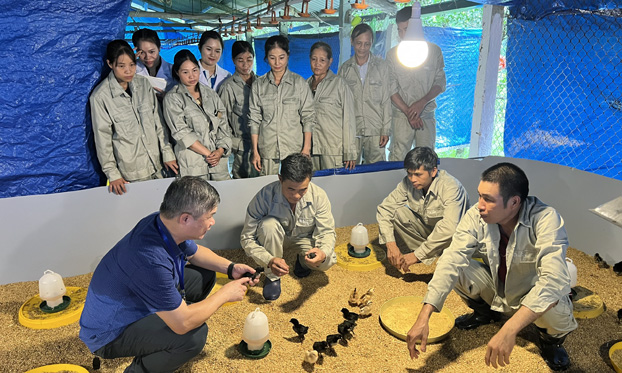 © FAO/Pawin Padungtod | VIET NAM Farmers field school established
FAO, the Department of Animal Health, MARD and Thai Nguyen sub- Department of Livestock Production and Animal Health established the farmer field schools (FFS). The initiative was carried out with financial support from the United Kingdom Agency for International Development (UKAid) and aimed to improve farm biosecurity and animal management practices to reduce antibiotics use in small-scale poultry farming and test data collection tools for antimicrobial usage in Thai Nguyen province. The expected success of the FFSs is likely to be extended to other localities in Viet Nam in the future. |
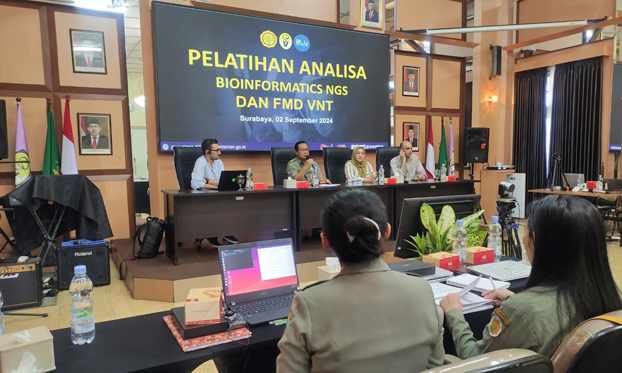 © Balai Besar Veteriner Farma Pusvetma/Achmad Zamrozi | INDONESIA Workshop on zoonotic priority diseases risk mapping
FAO and DGLAHS, through USAID funding, conducted a cross-sectoral risk mapping workshop from 2 to 6 September. The workshop was designed to enhance the skills of technical staff from different ministries and improve their ability to effectively map disease risks. This event is part of FAO’s collaborations with the Faculty of Veterinary and Agricultural Science, University of Melbourne to develop the competencies of technical staff from various ministries in assessing the risks of priority zoonotic diseases and emerging infectious diseases. |
Learn more about our work on risk reduction along the value chain here.
| |
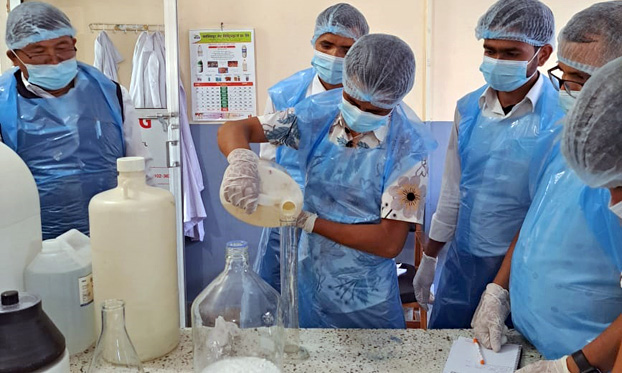 © FAO/Surendra Karki | NEPAL Sample collection, dispatch and epidemiological reporting training for animal health professionals FAO, through USAID and Pandemic Fund, conducted two training on “Sample collection, dispatch and epidemiological reporting” in the veterinary laboratory, Pokhara, between 28 August and 2 September. The objective of this training was to equip the animal health professionals working in these districts with hands-on skills in appropriate sample collection, packaging and dispatch of samples for prompt disease diagnosis. The training was conducted in collaboration with DLS and central veterinary laboratory.
|
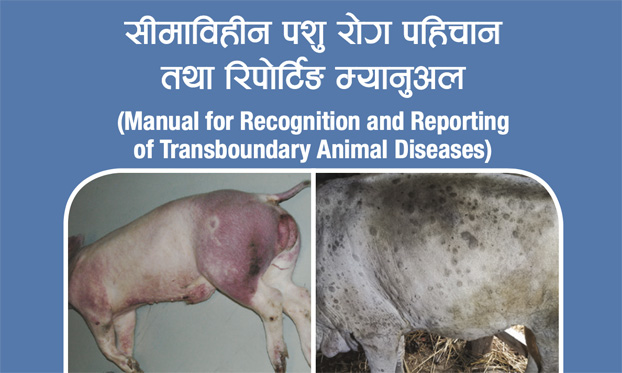 © FAO/Surendra Karki | NEPAL Publication of a manual for recognition and reporting of transboundary animal diseases With USAID-funded programme, FAO and DLS published the “Manual for recognition and reporting of transboundary animal diseases.” This manual covers 38 animal diseases, including notifiable and prioritized zoonotic diseases, along with those requiring quarantine, as listed by the Government of Nepal. It provides guidance on sample collection, packaging and dispatch. The handbook will be a valuable resource for field-level animal health workers in recognizing and reporting notifiable diseases and collecting samples for laboratory diagnosis.
|
| Learn more about our work on surveillance here. | |
